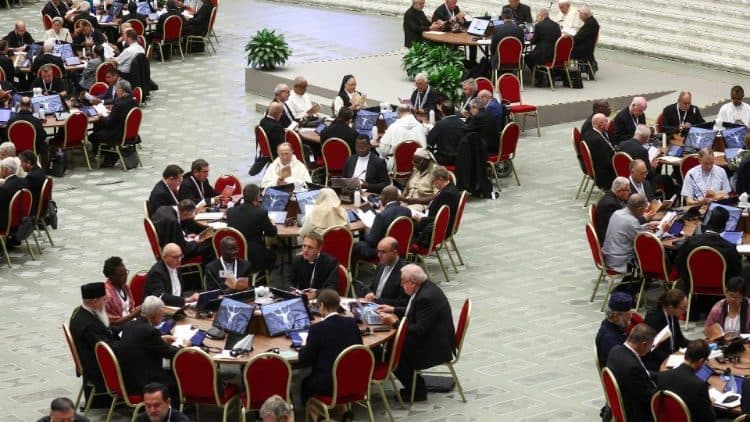ROME – After three years of discussion, debate and, at times, division, the concluding act of Pope Francis’s Synod of Bishops on synodality kicks off today with the opening of a two-day spiritual retreat before the 368 participants in the second, and final, Roman assembly start their conversations.
As during the first session of the synod last year, the retreat will be led by Dominican Father Timothy Radcliffe and Benedictine Mother Ignazia Angelini, organized into four “meditations” over the two days. The retreat will also feature a Mass tonight in St. Peter’s Basilica, and a penitential liturgy tomorrow evening in the presence of the pope, in which, among other things, victims of abuse, of war and of indifference to migrants will offer testimony.
Forgiveness will be asked for a litany of sins, including abuse, “using doctrine as stones to be hurled,” and war and violence, as well as offenses against creation, indigenous populations, migrants, women, families and youth. Forgiveness will also be asked for an absence of “listening, communion and participation,” key themes of the synod itself.
Of the 368 participants this time around, 272 are bishops and the rest are a mix of priests, deacons, male and female religious and laity. There are also eight papally nominated “special guests,” including, as last time, Luca Casarini, a co-founder of the “Mediterranea Saving Humans” organization which rescues migrants at sea, but which has been accused of favoring illegal immigration in Italy.
The number of representatives of other churches this time has risen from 12 to 16, including representatives from the Syriac Orthodox Church and the Lutheran World Federation, though the Russian Orthodox Church continues to be a no-show.
Wednesday, Oct. 2, marks the official opening of the synod itself with a Mass in St. Peter’s Square at 9:30 a.m. Rome time, and the first working session that afternoon at 4:00 p.m., which will begin with a greeting from Pope Francis.
The schedule provides for a rotation among plenary sessions and exchanges within 36 smaller working groups, organized into five round tables by language: Two in English, one in Italian, one in French, one in Spanish and one in Portuguese.
The plenary sessions will receive input from the smaller groups and then set the wheels in motion towards the production of a final document – which, according to organizers, is not the actual conclusion of the synod but simply a way to transmit its suggestions to the pope, who will then decide himself how to present the results to the Church and the wider world.
While the same restrictions as in October 2023 on synod participants disclosing its inner workings are in force this time as well, there will be four public events along the way: Two on Oct. 9, and two more on Oct. 16. The sessions will be held at an institute run by the Augustinian order and the headquarters of the Jesuits, both within a stone’s throw of St. Peter’s Square.
The themes of the public sessions are: “The people of God, subject of mission”; “The role and the authority of the bishop in a synodal Church”; “The mutual relationship between the local church and the universal Church”; and “The exercise of primacy and the synod of bishops.”
On Friday, Oct. 11, there will be an ecumenical prayer service in Rome’s Piazza of the Proto-Martyrs, where, according to tradition, St. Peter was crucified upside down. The date, Oct. 11, marks the 62nd anniversary of the opening of the Second Vatican Council in 1962. The 16 representatives of various Christian churches in the synod will take part, as well as other ecumenical representatives present in Rome.
On Sunday, Oct. 20, there will also be a Mass for the canonization of Spanish Franciscan Father Manuel Ruiz López and 10 companions, including fellow Franciscans and three laypersons who belonged to the Maronite church in communion with Rome. They were captured by Druze militants in Syria in 1860 and eventually killed, as part of an effort to wipe out the Christian community in Damascus.
The group was beatified by Pope Pius XI in 1926, and now will be formally declared saints by Pope Francis.
Also set to be canonized in the same ceremony are Giuseppe Allamano, founder of the Consolata missionaries; Elena Guerra, a friend of Pope Leo XIII known for her devotion to the Holy Spirit; and Marie-Léonie Paradis, a Canadian nun and founder of the the Little Sisters of the Holy Family.










